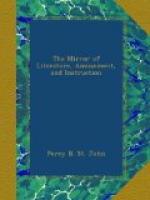From a single sheet found in Sir Hans Sloane’s library, in the British Museum, and printed by Mr. Ellis in his Original Letters, Second Series, it appears that tea was known in England in the year 1657, though not then in general use. The author of this paper says, “That the vertues and excellencies of this leaf and drink are many and great, is evident and manifest by the high esteem and use of it (especially of late years) among the physicians and knowing men in France, Italy, Holland, and other parts of Christendom; and in ENGLAND it hath been sold in the leaf for six pounds, and sometimes for TEN pounds the pound weight, and in respect of its former scarceness and dearness, it hath been only used as a regalia in high treatments and entertainments, and presents made thereof to princes and grandees, till the year 1657.”
Secretary Pepys, in his Diary, vol. i. p. 76, without saying where he had his drink, makes the following entry:—“Sept. 25th, 1660. I did send for a cup of tea (a China drink) of which I never had drunk before, and went away.”
In a letter from Mr. Henry Savill to his uncle, Secretary Coventry, dated from Paris, Aug. 12, 1678, and printed by Mr. Ellis, the writer, after acknowledging the hospitalities of his uncle’s house, quaintly observes, “These, I hope, are the charms that have prevailed with me to remember (that is to trouble) you oftener than I am apt to do other of my friends, whose buttery-hatch is not so open, and who call for TEA instead of pipes and bottles after dinner; a base unworthy Indian practice, and which I must ever admire your most Christian family for not admitting. The truth is, all nations have grown so wicked as to have some of these filthy customs.” In 1678, the year in which the above letter is dated, the East India Company began the importation of tea as a branch of trade; the quantity received at that time amounting to 4,713 lbs. The importation gradually enlarged, and the government, in consequence, augmented the duties upon tea. By the year 1700, the importation of tea had arrived at the quantity of 20,000 lbs. In 1721, it exceeded a million of pounds. In 1816, it had arrived at 86,234,380 lbs. Something more than thirty millions of pounds is probably the present average of importation: some allowance must be made for tea damaged and spoiled upon the passage.—See more on this subject, well worthy of perusal, in Mr. Ellis’s Letters, Second Series, vol. iv. pp. 57, et seq.
* * * * *
DANGER.
FROM L’ADONE OF MARINO.
(For the Mirror.)
Like some lone Pilgrim in the dusky night,
Seeking, through unknown paths,
his doubtful way,
While thick nocturnal vapours veil his
sight
From yawning chasms, that
’neath his footsteps lay;
Sudden before him gleams the forked light!
Dispels the gloom, yet fills
him with dismay.
His trembling steps he then retraces back,
And seeks again the well-known
beaten track.




